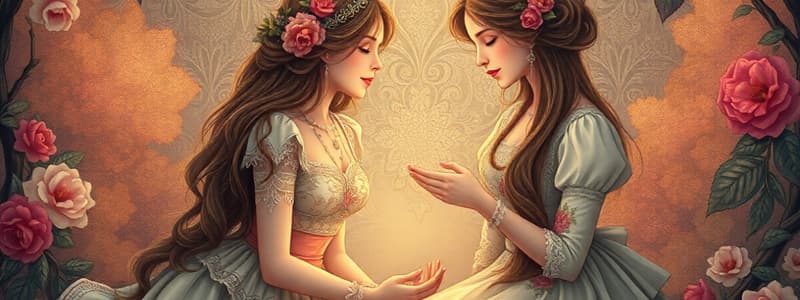Podcast
Questions and Answers
What does the poet mean when she states that her friend came 'bridging that chasm that divides us'?
What does the poet mean when she states that her friend came 'bridging that chasm that divides us'?
- The friend has overcome societal barriers. (correct)
- The friend has deep-rooted traditions.
- The friend has forgotten their social status. (correct)
- The friend is unaware of caste divisions.
How does the poet feel when her friend criticizes the way food is served?
How does the poet feel when her friend criticizes the way food is served?
- Indifferent and unaffected.
- Joyful and validated.
- Embarrassed and ashamed. (correct)
- Proud and accomplished.
What does the phrase 'my hand which had just touched the sky was knocked down' symbolize?
What does the phrase 'my hand which had just touched the sky was knocked down' symbolize?
- A celebration of friendship.
- A return to reality after disappointment. (correct)
- A moment of triumph.
- An acceptance of failure.
What does the poet reflect on after feeling sad and numb?
What does the poet reflect on after feeling sad and numb?
What is implied by the statement 'Dear Friend – Shrikhand was not even a word in our vocabulary'?
What is implied by the statement 'Dear Friend – Shrikhand was not even a word in our vocabulary'?
What does the arrival of the friend to dinner symbolize?
What does the arrival of the friend to dinner symbolize?
What criticism does the friend make regarding the meal served?
What criticism does the friend make regarding the meal served?
What aspect of her friend's behavior indicates they have not fully moved past traditional caste divides?
What aspect of her friend's behavior indicates they have not fully moved past traditional caste divides?
Flashcards
Irony in the poem's title
Irony in the poem's title
The title "Bosom Friend" is ironic because the friend's actions and words reveal a deep-seated prejudice and lack of understanding, contradicting the idea of a close and supportive friendship.
Who does the friend refer to with 'you folk'?
Who does the friend refer to with 'you folk'?
The friend refers to the poet and other people from a similar socio-economic background as "you folk" The use of this term highlights the social divide and emphasizes the friend's sense of superiority.
What was the poet's childhood like?
What was the poet's childhood like?
The poet had a very impoverished childhood, lacking basic necessities like milk and proper food. Her family struggled, with the mother cooking on sawdust and often having to eat plain bread.
What does "Its roots go deep in your mind" mean?
What does "Its roots go deep in your mind" mean?
Signup and view all the flashcards
Why does the friend criticize the food arrangement?
Why does the friend criticize the food arrangement?
Signup and view all the flashcards
What analogy is used to describe the poet's memories?
What analogy is used to describe the poet's memories?
Signup and view all the flashcards
How does the poet feel about her friend's comments?
How does the poet feel about her friend's comments?
Signup and view all the flashcards
What are the major themes explored in the poem?
What are the major themes explored in the poem?
Signup and view all the flashcards
Study Notes
Poem Summary
- The poem, "Bosom Friend," depicts a social interaction where a woman challenges traditional caste-based customs
- The speaker, a host, feels humbled and ashamed when her guest critiques her culinary choices
- The guest's comment on the lack of yogurt or buttermilk highlights the speaker's limited food resources and her own background
- The poem explores themes of tradition, inequality, class, and societal expectations
Tone and Mood
- The initial tone is one of pride and happiness, shifting to humiliation and sadness as the speaker confronts the guest
- The guest confronts the speaker about traditional norms in a tactless way
- Her response elicits shame and silence in the speaker
- The tone gradually becomes one of introspection, empathy, and understanding
Analysis
- The speaker's sense of shame stems from her background and the guest's critique of tradition
- The guest's questions touch on social disparity and caste inequalities
- The poem showcases conflict between tradition and equality and the contrast between perceptions
Key Themes
- Caste System: The poem reflects the historical caste system and its impact on social dynamics
- Social Inequality: The poem portrays social disparity and inequality, highlighting how tradition can negatively influence lives
- Expectation and Social Pressure: It examines societal expectations and the pressure placed on those who oppose traditional norms
Figures of Speech
- Irony: The title "Bosom Friend" creates irony, as the relationship between the speaker and guest is strained by social differences
- Metaphor: The sky symbolizes freedom and wide-ranging horizons, contrasting with the speaker's immediate surroundings
- Simile: The speaker's courage is compared to a falling star, highlighting the crushing impact of the guest's actions
Key Questions
- The poem's title "Bosom Friend" creates a sense of irony suggesting a close friendship strained by social differences
- The poem's title questions whether the guest is truly a "bosom friend"
- What is the author's tone in the last two lines?
- What kind of childhood did the author have?
- How are the words "sky" and "star" used to describe both the author's happiness and sorrow?
Studying That Suits You
Use AI to generate personalized quizzes and flashcards to suit your learning preferences.




